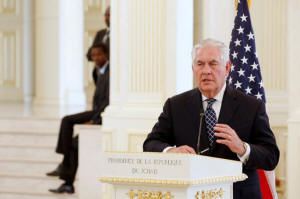|
U.S. may lift travel ban on 'important
partner' Chad, Tillerson says
 Send a link to a friend
Send a link to a friend
 [March 13, 2018]
N'DJAMENA (Reuters) - U.S. Secretary
of State Rex Tillerson said on Monday that Washington was considering
lifting a travel ban on Chad, offering an olive branch to an ally in the
fight against Islamist militant groups in West Africa. [March 13, 2018]
N'DJAMENA (Reuters) - U.S. Secretary
of State Rex Tillerson said on Monday that Washington was considering
lifting a travel ban on Chad, offering an olive branch to an ally in the
fight against Islamist militant groups in West Africa.
The top U.S. diplomat flew into the Chadian capital, N'Djamena, on the
last day of a truncated tour of Africa with stops in Kenya, Ethiopia,
Djibouti and Nigeria - all frontline partners against Islamic State and
al Qaeda offshoots.
It was his first diplomatic visit to the continent where many are still
smarting from U.S. President Donald Trump's reported dismissal of states
there as "shithole" countries in January. Trump later denied making the
comment.
Tillerson said Chad had taken important steps to strengthen control over
its security and passports. "These steps I think are going to allow us
to begin to normalise the travel relationship with Chad," he told
reporters.
A report on Chad's progress was being prepared in Washington and would
be reviewed by Trump next month, Tillerson said. "We have to wait for
the final report," he added.
Tillerson, who met Chadian President Idriss Deby previously while
serving as chief executive of ExxonMobil, said he was concerned about
the presence of Islamic State-allied militants in the Sahel and called
Chad an "important partner".

TRIP CUT SHORT
In September, The Trump administration added Chad - along with North
Korea and Venezuela - to a list of countries whose citizens are
restricted from travelling to the United States. That drew protests from
Chad and others, including France, which works closely with the Chadian
military.
Officials from the U.S. Department of Homeland Security said at the time
that Chad had to failed to send proof that it had taken a number of
security measures.
Chad's Deby "expressed his incomprehension" about the ban during a
meeting with Tillerson on Monday, Foreign Minister Cherif Mahamat Zene
said.
Tillerson flew to Nigeria after Chad for a stay of just a few hours,
less than the overnight visit originally planned. His entourage said he
had been forced to cut short the African tour on Monday to return to
deal with urgent work in Washington.
[to top of second column]
|

U.S. Secretary of State Rex Tillerson speaks during a news
conference with Chad's Foreign Minister Mahamat Zene Cherif in
N'Djamena, Chad, March 12, 2018. REUTERS/Jonathan Ernst

He held talks with President Muhammadu Buhari behind closed doors in
the capital, Abuja.
Following their talks, Buhari's office issued a statement saying the
president discussed plans to negotiate for the release of 110 girls
abducted from a school in the northeastern town of Dapchi last month
rather than use a military option.
The girls are suspected of having been abducted by members of Boko
Haram.
Tillerson also held a news conference with Nigeria's foreign affairs
minister, Geoffrey Onyeama, during which he said the United States
was helping Nigeria in the fight against the jihadist group and in
the hunt for the missing girls.
"Supporting, equipping, training and we can advise and provide
information - I think that's the best way we can help the government
of Nigeria secure the release of these girls which we hope will be
done in a peaceful manner," he said.
In a statement issued later on Monday, the U.S. State Department
said that during Tillerson's meeting with Buhari, the secretary of
state recognized Nigeria's leadership in efforts to defeat Islamist
militant groups in West Africa, and expressed concern about the
recent attacks and abductions.
The Africa tour coincided with several urgent foreign policy
developments, including Thursday's announcement that Trump will meet
North Korean leader Kim Jong Un.
(Reporting by pool reporter and Paul Carsten in Abuja; Additional
reporting by Eric Walsh in Washington; Writing by Maggie Fick and
Joe Bavier; Editing by Larry King and Peter Cooney)
[© 2018 Thomson Reuters. All rights
reserved.]
Copyright 2018 Reuters. All rights reserved. This material may not be published,
broadcast, rewritten or redistributed.
Thompson Reuters is solely responsible for this content.
 |